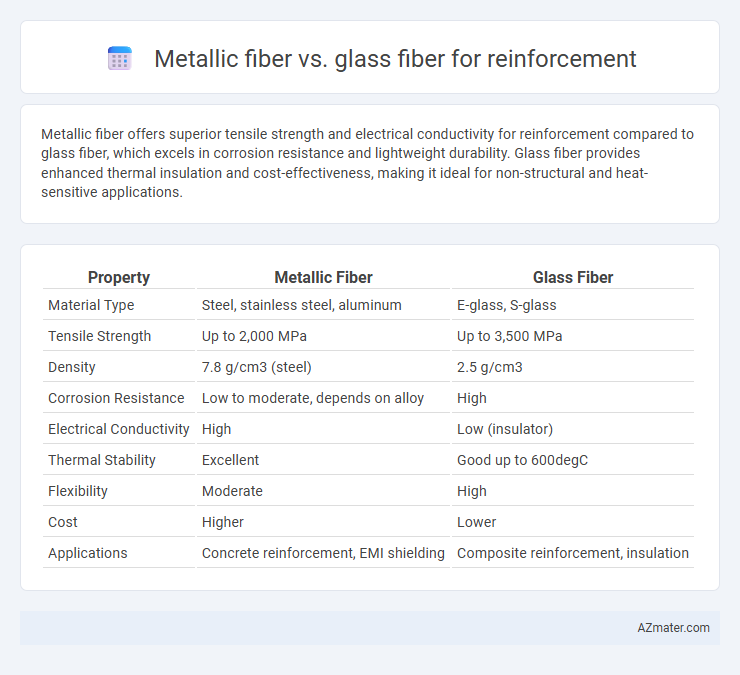Metallic fiber offers superior tensile strength and electrical conductivity for reinforcement compared to glass fiber, which excels in corrosion resistance and lightweight durability. Glass fiber provides enhanced thermal insulation and cost-effectiveness, making it ideal for non-structural and heat-sensitive applications.
Table of Comparison
| Property | Metallic Fiber | Glass Fiber |
|---|---|---|
| Material Type | Steel, stainless steel, aluminum | E-glass, S-glass |
| Tensile Strength | Up to 2,000 MPa | Up to 3,500 MPa |
| Density | 7.8 g/cm3 (steel) | 2.5 g/cm3 |
| Corrosion Resistance | Low to moderate, depends on alloy | High |
| Electrical Conductivity | High | Low (insulator) |
| Thermal Stability | Excellent | Good up to 600degC |
| Flexibility | Moderate | High |
| Cost | Higher | Lower |
| Applications | Concrete reinforcement, EMI shielding | Composite reinforcement, insulation |
Introduction to Reinforcement Fibers
Metallic fibers and glass fibers serve as crucial reinforcement materials in composite applications, each offering unique mechanical properties that enhance the strength and durability of the final product. Metallic fibers provide excellent electrical conductivity, impact resistance, and high tensile strength, making them ideal for structural reinforcement where toughness and load-bearing capacity are critical. Glass fibers, characterized by high tensile strength, corrosion resistance, and lightweight properties, are widely used in industries such as aerospace, automotive, and construction to improve composite stiffness and thermal insulation.
Overview of Metallic Fiber
Metallic fibers, typically made from steel or stainless steel, offer superior tensile strength and impact resistance compared to glass fibers, making them ideal for reinforcement in high-stress applications such as concrete structures and composites. These fibers enhance durability, corrosion resistance, and load distribution while providing better crack control under dynamic loading conditions. Metallic fiber reinforcement is preferred in sectors requiring enhanced mechanical performance and long-term structural integrity.
Overview of Glass Fiber
Glass fiber is a widely used reinforcement material known for its high tensile strength, lightweight nature, and excellent corrosion resistance. It consists of fine fibers made from molten glass that are woven into fabrics or chopped into mats, providing superior mechanical properties and thermal stability in composite applications. Compared to metallic fibers, glass fiber offers better electrical insulation, lower cost, and resistance to chemical degradation, making it ideal for automotive, aerospace, and construction industries.
Mechanical Properties Comparison
Metallic fibers exhibit higher tensile strength and better impact resistance compared to glass fibers, making them suitable for applications requiring enhanced durability and load-bearing capacity. Glass fibers offer superior stiffness and lower density, contributing to lightweight structures with excellent dimensional stability but lower elongation at break. The choice between metallic and glass fibers depends on the required balance between mechanical strength, weight, and flexibility in reinforced composites.
Durability and Longevity
Metallic fiber reinforcement offers superior durability with high resistance to impact, abrasion, and elevated temperatures, ensuring extended structural longevity in harsh environments. Glass fiber provides excellent strength-to-weight ratio and corrosion resistance but is more susceptible to moisture-induced degradation and alkali attack over time. Selecting metallic fibers enhances long-term performance in applications with extreme mechanical stress, while glass fibers are preferred for moderate conditions requiring lightweight and corrosion-resistant reinforcement.
Corrosion and Chemical Resistance
Metallic fibers, such as steel or stainless steel, offer high tensile strength but are prone to corrosion when exposed to moisture, salts, and acidic environments, necessitating protective coatings for durability. Glass fibers exhibit excellent chemical resistance against acids, alkalis, and solvents, maintaining structural integrity without corrosion in harsh environments. For reinforcement applications requiring longevity in chemically aggressive settings, glass fiber is generally preferred due to its superior resistance to degradation compared to metallic fibers.
Weight and Density Differences
Metallic fibers, typically composed of steel or aluminum, have significantly higher densities ranging from 2.7 to 7.8 g/cm3 compared to glass fibers, which generally exhibit densities around 2.5 g/cm3. This density difference results in metallic fiber reinforcements adding more weight to composites, impacting applications where lightweight materials are critical. Glass fibers offer a superior strength-to-weight ratio, making them preferable in aerospace and automotive industries aiming to reduce structural weight without compromising performance.
Cost and Economic Considerations
Metallic fibers, such as steel, generally have higher material costs compared to glass fibers due to raw material and manufacturing expenses, yet they offer superior tensile strength and durability which can reduce maintenance costs in long-term applications. Glass fibers are more cost-effective upfront and provide adequate reinforcement for many structural purposes, making them a popular choice for budget-sensitive projects. Economic considerations must balance the initial investment against lifecycle performance, with metallic fibers often favored in high-load or high-wear environments despite their higher price.
Applications in Construction and Industry
Metallic fibers offer superior tensile strength and corrosion resistance, making them ideal for reinforcing concrete in heavy industrial flooring and seismic-resistant structures. Glass fibers provide excellent thermal insulation and chemical resistance, commonly used in facade panels, roofing, and HVAC systems for enhanced durability. Construction projects requiring lightweight reinforcement often prefer glass fibers, while steel mills and industrial plants demand the robustness of metallic fibers for structural components.
Choosing the Right Fiber for Your Project
Metallic fibers offer superior tensile strength and electrical conductivity, making them ideal for applications requiring enhanced durability and electromagnetic interference shielding. Glass fibers provide excellent corrosion resistance and thermal stability at a lower cost, suitable for lightweight structural reinforcement in construction and automotive industries. Selecting the right fiber depends on project-specific criteria such as mechanical load, environmental exposure, and budget constraints to optimize performance and longevity.

Infographic: Metallic fiber vs Glass fiber for Reinforcement
 azmater.com
azmater.com